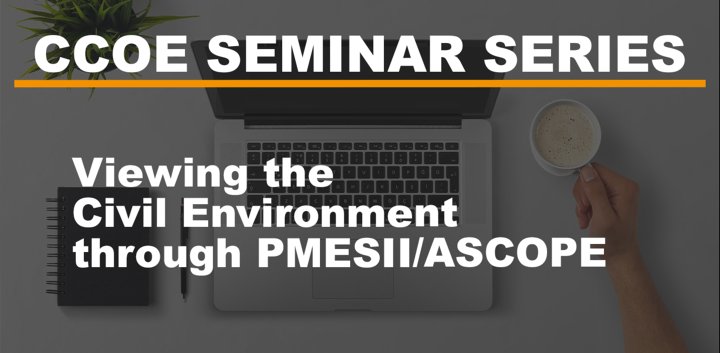Viewing the Civil Environment through PMESII/ASCOPE (22 APR 2021)
Situational awareness and understanding are vital elements for mission success. To enhance the understanding of the Civil Environment different frameworks can be applied to help comprehend the Civil Environment and better organise information. Most popular amongst planners and analysts is the PMESII (Political, Military, Economic, Social, Infrastructure, Information) and ASCOPE (Areas, Structures, Capabilities, Organizations, People, Events) framework which helps to monitor key factors in the operating environment.
However, should PEMESII/ASCOPE be seen as an analytical tool or as a way to structure information within a wider analytical context? This and other questions are elaborated on in the seminar ‘Viewing the Civil Environment through PMESII/ASCOPE’ - a practitioner’s perspective.
Our expert Captain Judy Rojas, Future Operations Officer, US Marine Corps Civil-Military Operations School discusses the different ways of using PMESII/ASCOPE to establish a better understanding of the Civil Environment in support of enhanced decision-making.
The seminar thereby responds to the following guiding questions:
- In what contexts and how do you use PMESII/ASCOPE?
- What is the value-added by PMESII/ASCOPE?
- What are the challenges and potential pitfalls?
Feel invited to discover background information about the seminar and our speaker by approaching the speaker’s presentations and biography as well as the seminar minutes and video recordings.
For further information about the CCOE Seminar Series, we would recommend you to have a look at the overview.
Judy Rojas
At the time of the seminar, Captain Judy Rojas served as the Future Operations Officer at the Marine Corps Civil-Military Operations School. Judy’s initial interest in civil-military interactions began before her time in the military, with her interest in culture and languages along with a desire to interpret and translate interactions between civilians and military forces. This was one of the driving factors behind her enlisting in the Marine Corps, where she initially trained to become an Arabic linguist before her eventual commissioning as an officer.
As an Intelligence officer she began, focusing on Signals Intelligence and eventually progressed into Electronic Warfare in the Information Operations Cell of higher headquarters Fires & Effects Centers. While serving in the III Marine Expeditionary Force in the Information Operations Cell, she was first exposed to Marine Corps Civil Affairs while supporting Joint Task Force 505’s humanitarian assistance and disaster relief efforts for the Philippines in OPERATION DAMAYAN.
Later, Capt Rojas directly served Marine Corps Civil Affairs as the Civil Affairs Integrator at Headquarters Marine Corps, advocating for service-level capabilities, gaps and requirements for Civil Affairs matters dealing with doctrine, organization, training, material, leadership & education and policy.
Within the Marine Corps Civil-Military Operations School, she directly supported curricula involving Civil Preparation of the Battlespace (CPB), CA support to Operations in the Information Environment and the topics relating to Marine Corps Civil Information Management System.
Presentations and additional literature:
Block 1 - Defining ASCOPE/PMESII
- ASCOPE/PMESII- Planning Template
- Fowler (2021). Making PMESII Relevant: an approach to framing complex security problems. Paper presented at International Studies Association, April 2021.
- Enstad, K. (2020). “Understanding Cultural Differences: The Limitations of ASCOPE/PMESII.” In: Enstad, K. and P. Holmes-Eber (eds.). Warriors or Peacekeepers? Building Military Cultural Competence. Cham: Springer. p. 59-74.
- CCOE CIMIC Handbook, Section 5.3.1. PMESII & Technology, Environment (TE) – ASCOPE.
- Moore, M.B. (2017), ‘Embracing analytics: A path forward for the intelligence community’.
Block 2 - Civil Preparation of the Battlespace (CPB) - An Introduction
- Salmoni, B. A., & Holmes-Eber, P. (2008). Operational culture for the warfighter: Principles and applications. Marine Corps.
Block 3 - Stability Assessment Framework (SAF) - An Introduction

